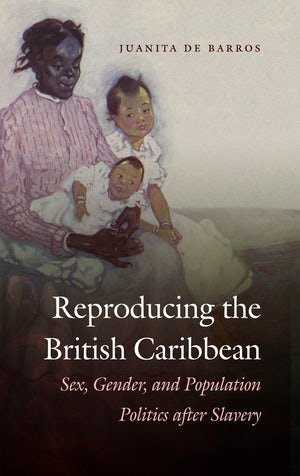Reproducing the British Caribbean: Sex, Gender, and Population Politics after Slavery

Invested in the success of the “great experiment” of slave emancipation, colonial officials developed new social welfare and health policies. Concerns about the health and size of ex-slave populations were expressed throughout the colonial world during this period. In the Caribbean, an emergent black middle class, rapidly increasing immigration, and new attitudes toward medicine and society were crucial factors. While hemispheric and diasporic trends influenced the new policies, De Barros shows that local physicians, philanthropists, midwives, and the impoverished mothers who were the targets of this official concern helped shape and implement efforts to ensure the health and reproduction of Caribbean populations in the decades before independence.
Juanita De Barros is a professor of History at McMaster University and former president of the Canadian Association of Latin American and Caribbean Studies.
Other publications from this author include:
- PUBLIC HEALTH AND THE IMPERIAL PROJECT (2016)
- “Crossing colonial boundaries: health and the responses of ‘colonial mediators’ to the crisis of the 1930s in the French and British Caribbean” in Canadian journal of Latin American and Caribbean studies, 38 (2) (2014)
- “‘A Laudable Experiment’: Infant Welfare Work and Medical Intermediaries in Early Twentieth-century Barbados” in Public Health in the British empire: Intermediaries, Subordinates, and Public Health Practice, 1850-1960 (2011)
- “Historical Commentaries. British Guiana (Guyana)” in The Marcus Garvey Universal Negro Improvement Association Papers, Volume XI: The Caribbean Diaspora, 1910-1920 (2011)
- “Improving the Standard of Motherhood: Infant Welfare in Post-Slavery British Guiana” in Health and Medicine in the circum-Caribbean, 1800-1968 (2009)
- Health and Medicine in the Caribbean: Historical Perspectives (2009)
- Beyond Fragmentation: Perspectives on Caribbean History (2006)
- “‘Working Cutlass and Shovel’: Labour and Redemption at the Onderneeming School in British Guiana” in Contesting Freedom: Control and Resistance in the Post-emancipation Caribbean (2005)
- “Urban British Guiana, 1838-1924: Wharf Rats, Centipedes, and Pork Knockers” in Masters, Servants, and Magistrates in Britain and the Empire, 1562–1955 (2004)
- Order and Place in a Colonial City: Patterns of Struggle and Resistance in Georgetown, British Guiana, 1889-1924 (2002)
